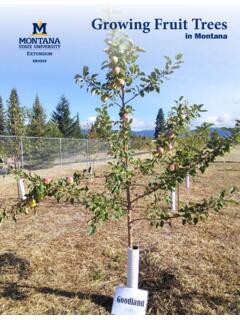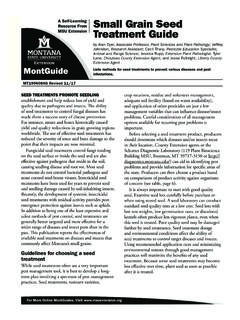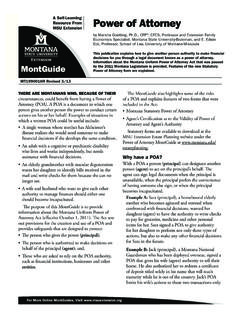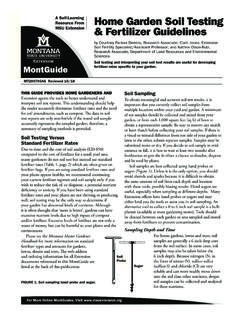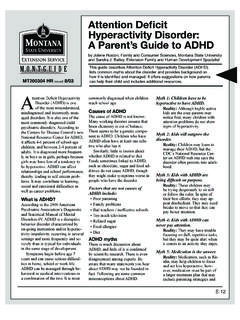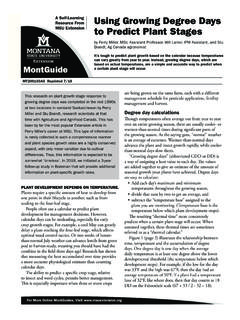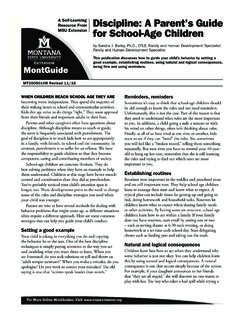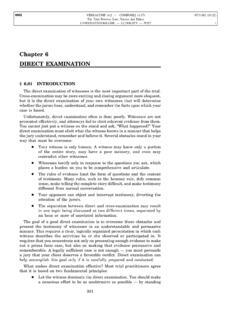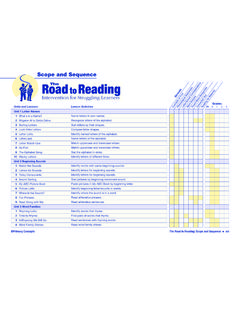Transcription of The Importance of Play in Early Childhood Development
1 The Importance of Play in Early Childhood Development by Jona K. Anderson-McNamee, MSU Extension Family and Consumer Science Agent, Cascade County, and Sandra J. Bailey, Family and Human Development Specialist, MSU. Play is essential for a child's Development and for learning life skills. While the information in this publication is specifically for parents, the information applies to other adults including grandparents, extended family members and MontGuide child care providers that have opportunities to affect the play of children. MT201003HR New 4/10. PLAY IS A CHILD'S WORK. PLAY IS IMPORTANT Playing With Your Child for children's Development and for children to bond. It In today's world of balancing work and home schedules, offers a chance to connect with your child.
2 You are your parents find it hard to have quality time with their children. child's first teacher and much of that teaching happens It is essential for parents to make the best use of time they through play. Play helps your child learn the rules of your have with their children. Your child needs time with you to family and what is expected of him or her. As children grow, relax and play. play helps them learn how to act in society. Playing with children builds lasting bonds. Playing Parents need to make time to play with their children. allows parents to appreciate the uniqueness of each child. You start to play when your child is an infant. When your Playing with children can also be a stress reducer for over- baby starts to smile and you worked parents.
3 Laughing smile back, you are engaging and relaxing are important to in play. Play is directed by When you asked me what I did in school today your own well-being. the child and the rewards and I say, 'I just played.' Please don't misunderstand Try to spend individual come from within the me. For you see, I am learning as I play. I am time with each of your child. Play is enjoyable and learning to enjoy and be successful in my work. children. When a parent or spontaneous. Play helps your sibling plays a board game Today I am a child and my work is play.. child learn social and motor with a child, shares a bike skills and cognitive thinking. Anita Wadley, 1974. ride, plays baseball, or reads a Children also learn by story, the child learns playing with others.
4 You self- Importance . Your child's self-esteem gets a boost. You provide the setting for your child to play with others. As are sending positive messages to your child when you spend your children grow, you provide toys, materials, and sports quality playtime with him. From these Early interactions, equipment so that they can play with others. It is important children develop a vision of the world and gain a sense of that children learn that play is important throughout life. their place in it. Play is needed for healthy Development for your child. Family activities are important for the whole family. They Research shows that 75 percent of brain Development occurs help develop strong family bonds, which can last a lifetime.
5 After birth. Play helps with that Development by stimulating Families who play together are more cooperative, supportive the brain through the formation of connections between and have better communication. Have movie nights and nerve cells. This process helps with the Development of fine game nights, or go for walks together. A game night allows and gross motor skills. Fine motor skills are actions such parents to teach children to take turns, how to win, how to as being able to hold a crayon or pencil. Gross motor skills lose and methods of sequencing events. Listening to music are actions such as jumping or running. Play also helps together by singing along, or playing rhythm instruments your child to develop language and socialization skills.
6 Play will help children to listen for and recognize patterns in allows children to learn to communicate emotions, to think, music, which will assist with math skills in school. If you be creative and solve problems. are a single parent or have only one child, invite family and friends over to play. For More Online MontGuides, Visit Today, children of all ages are exposed to technology Associative play: When your children are around three such as computers and videos. Children who spend most of to four years of age, they become more interested in other their time using technology often are not physically active children than the toys. Your child has started to socialize or using their imagination.
7 You can help your child by with other children. This play is sometimes referred to reducing screen time. Limit screen time to no more than two as loosely organized play. Associative play helps your hours per day. Make sure your child gets a minimum of one preschooler learn the do's and don'ts of getting along hour of physical exercise everyday. with others. Associative play teaches the art of sharing, You have important roles in play. You can encourage play encourages language Development , problem-solving skills by providing interesting materials that promote exploration and cooperation. In associative play, groups of children have and learning. Playing with your child helps him learn how to similar goals.
8 They do not set rules, although they all want manipulate toys and other play materials by modeling your to be playing with the same types of toys and may even trade actions. toys. There is no formal organization. Social play: Children around the age of three are Types of Play beginning to socialize with other children. By interacting As your child grows and develops, his or her play evolves. with other children in play settings, your child learns social Certain types of play are associated with, but not restricted rules such as give and take and cooperation. Children are to, specific age groups. able to share toys and ideas. They are beginning to learn Unoccupied play: In the Early months of infancy, to use moral reasoning to develop a sense of values.
9 To be from birth to about three months, your child is busy in prepared to function in the adult world, children need to unoccupied play. Children seem to be making random experience a variety of social situations. movements with no clear purpose, but this is the initial form Motor - Physical Play: When children run, jump, and of playing. play games such as hide and seek and tag they engage in Solitary play: From three to 18 months, babies will spend physical play. Physical play offers a chance for children to much of their time playing on their own. During solitary exercise and develop muscle strength. Physically playing with play, children are very busy with play and they may not seem your child teaches social skills while enjoying good exercise.
10 To notice other children sitting or playing nearby. They are Your child will learn to take turns and accept winning or exploring their world by watching, grabbing and rattling losing. objects. Solitary play begins in infancy and is common in Constructive Play: In this type of play, children create toddlers. This is because of toddlers' limited social, cognitive, things. Constructive play starts in infancy and becomes and physical skills. However, it is important for all age more complex as your child grows. This type of play starts groups to have some time to play by themselves. with your baby putting things in his/her mouth to see how Onlooker play. Onlooker play happens most often during they feel and taste.


